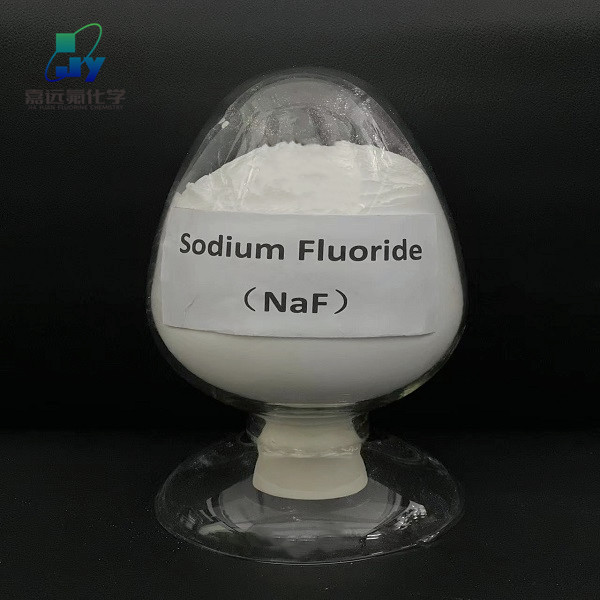



Inorganic fluorine products
Sodium fluoride ( FNa )
Domestic product consultation
0086-15366800998
Foreign Trade Hotline
0086-15366800998
Product Details
Product Name:Sodium fluoride
Abbreviation:FNa
Synonyms:Fluoruro Depotasio;Tryptose Cycloserine;Fluoruredepotassium
CAS:7681-49-4
Molecular formula:FNa
Molecular weight:41.99
Einecs:231-667-8
Dangerous goods transport number:UN1690/6.1/Ⅲ
Structural formula:
BRIEF DESCRIPTION
Sodium fluoride is an ionic compound. It is colorless crystal or white solid at room temperature and has no odor; the aqueous solution is weakly alkaline and dissolves in hydrofluoric acid to form sodium bifluoride, which can corrode glass. Sodium fluoride is an important fluoride salt that is widely used in wood preservatives, winemaking bactericides, electrolytic aluminum conditioners, tooth fluoridants and other fields.
TECHNICAL INDICATORS
Analysis | Requirement |
Appearance | White powder |
Purity(% by weight) | ≥99.00 |
Insoluble in water% | ≤0.05 |
Acidity mmo/100g | ≤5.0 |
Basicity mmol/100 | ≤2.0 |
Fluorosilicate (as SiF6)% | ≤0.06 |
Heavy metal (Pb)% | ≤0.001 |
Chloride (Cl)% | ≤0.005 |
Sulfate (SO4)% | ≤0.03 |
Custom made | 3N, 4N, 5N, 6N can be customized |
USE
1. It can be used as a degassing agent for high carbon steel, such as boiling steel, a flux for electrolysis or electrolytic refining of aluminum, a waterproof treatment for paper, and a wood preservative (using sodium fluoride and nitrocresol or dinitrophenol For the base material of electric poles and other anti-corrosion materials), anti-cavity materials (drinking water, toothpaste, etc.), fungicides, insecticides, preservatives, etc.;
2. Used to prevent dental caries and treat oral caries in children in areas where drinking water lacks fluoride;
3. Small doses are mainly used for osteoporosis and Paget's disease of bone;
4. It can be used as a raw material for manufacturing other fluorides or as a hydrogen fluoride absorbent in fluorine chemicals;
5. It can be used as light metal fluoride salt treatment agent, smelting and refining protective agent, and UF3 adsorbent in the nuclear industry;
6. Cleaning fluids, fluxes and fluxes for steel and other metals;
7. Flux and sunscreen agent for ceramics, glass and enamel, hide and skin treatment agent for leather industry;
8. Used as a phosphating accelerator in ferrous metal surface treatment to stabilize the phosphating solution and improve the performance of the phosphating film;
9. Used as an additive in the production of sealing materials and brake pads to increase wear resistance;
10. Used as an additive in concrete to enhance the corrosion resistance of concrete.
STORAGE CONDITIONS
1. Store in a cool, dry and well-ventilated warehouse.
2. The storage temperature does not exceed 30°C and the relative humidity does not exceed 80%.
3. Store in a sealed container and keep away from children.
4. It should be stored separately from acids to prevent it from reacting with acidic substances.
5. Store separately from food chemicals, avoid mixed storage.
6. The storage area should be equipped with suitable materials to contain leaks.
7. The "five pairs" management system for extremely toxic substances should be strictly implemented.
PACKAGE
1. Plastic bags, cardboard buckets, plastic buckets;
2. Other forms of packaging according to customer needs
CHEMICAL PROPERTIES
The first type: industrial type.
1. Sodium fluoride is an important fluoride salt and is a raw material for manufacturing other fluorides.
2. Used in agricultural pesticides, sterilization, wood preservatives, water treatment, ceramic pigments, manufacturing of boiled steel, light metal fluoride salt treatment agents, etc.
3. Increase wear resistance in the production of sealing materials and brake pads. The mechanical blade planer is inlaid with steel to increase the welding strength.
4. Enamel pharmaceutical industry, paper production and building materials flocculant addition
5. Used as a phosphating accelerator in the coating industry to stabilize the phosphating solution, refine the phosphating, and improve the performance of the phosphating film.
Category 2: toothpaste grade
Mainly added to toothpaste. Adding sodium fluoride to toothpaste can prevent caries because the interaction between fluoride and tooth enamel can form fluoroapatite on the surface of tooth enamel, improving the hardness and acid resistance of tooth enamel and reducing the formation of plaque. , reduce the incidence of dental caries. Fluoride toothpaste does have a certain anti-caries effect.
Category 3: Spherical or flake sodium fluoride
Used as UF3 adsorbent in the nuclear industry. Used for the adsorption of special gases such as fluorine gas and the absorption of hydrogen fluoride impurities.
Category 4: Optical grade sodium fluoride
Mainly used in optical fields such as optical glass, optical fibers, and optical crystals.
Category 5: Battery grade sodium fluoride
Mainly used in electrolyte additives, as additives or as raw materials for sodium battery electrolyte sodium hexafluorophosphate.
Plant Evironment